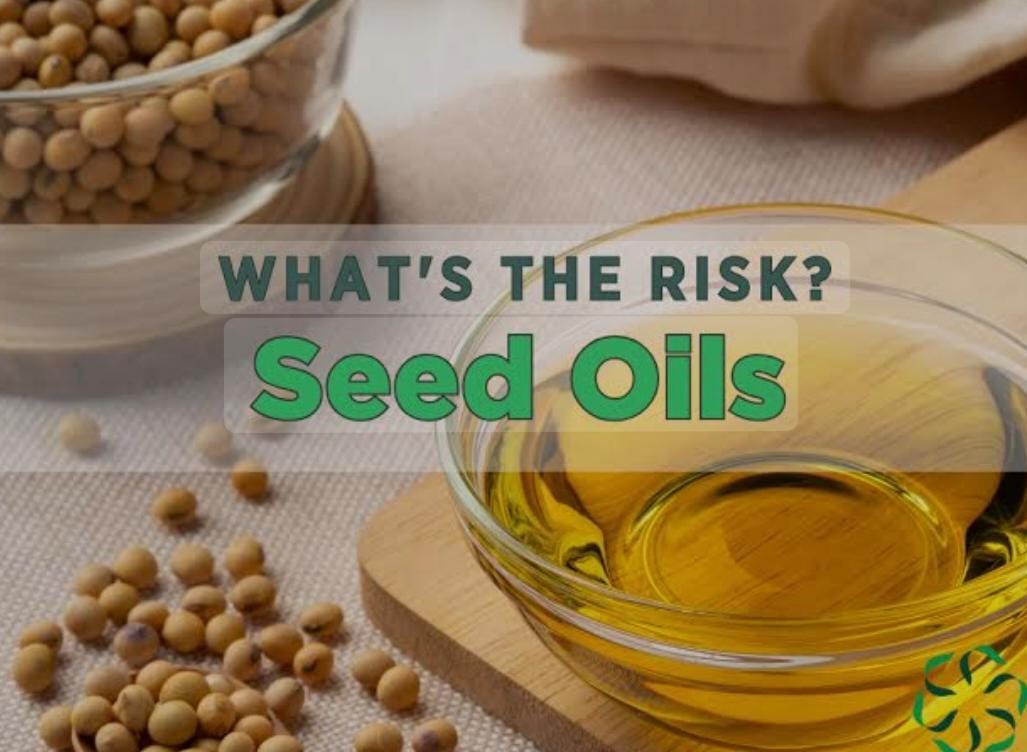In Ayurveda, seed oils, especially highly processed and refined vegetable oils, are not considered ideal for health due to the following reasons:
1. Heaviness & Indigestion (Guru & Ama Formation)
Many seed oils, especially refined ones, are heavy (guru) in nature, making them difficult to digest.
Poor digestion (agni) leads to toxin (ama) buildup, which can cause metabolic disorders
.2. Disturbance of DoshasVata Aggravation:
Highly processed oils lack the grounding and nourishing qualities of natural fats, which can worsen Vata-related issues like dryness, anxiety, and joint pain.
Pitta Aggravation: Oils from sunflower, safflower, and canola are heating in nature and can increase Pitta, leading to inflammation, acidity, and skin issues.
Kapha Imbalance: Heavy and refined oils can clog channels (srotas), leading to weight gain, sluggishness, and cholesterol imbalance.
3. Loss of Prana (Vital Energy)Traditional Ayurvedic fats like ghee, sesame oil, and coconut oil are considered high in prana (life energy).Highly processed seed oils lose their prana due to industrial extraction methods, making them lifeless and tamasic (dull and low-energy food).
4. Toxicity & Oxidative StressModern seed oils (e.g., soybean, sunflower, corn) are extracted using high heat and chemicals, which degrade their quality.
These oils are high in unstable polyunsaturated fats (PUFAs), which oxidize quickly and create free radicals, leading to inflammation and aging
.5. Altered Agni (Digestive Fire) & Metabolic IssuesProcessed oils suppress digestive fire (agni), leading to poor metabolism, sluggish digestion, and accumulation of bad cholesterol.
Ayurveda recommends natural fats like ghee to kindle agni rather than suppress it
.6. Impact on Mind (Manas) & EmotionsAyurveda classifies foods based on their effect on the mind—sattvic (pure), rajasic (stimulating), and tamasic (dull).
Processed seed oils are considered tamasic, leading to lethargy, mood swings, and a foggy mind.
So what are the ayurvedic alternative for seed oil?
Ghee (Clarified Butter)
Properties: Satvic, nourishing, enhances agni, improves memory and digestion.
Best for: All doshas, especially Vata and Pitta. Use in moderation for Kapha.
Uses: Cooking, sautéing, adding to rice, lentils, or even using in desserts.
2. Cold-Pressed Sesame Oil
Properties: Warming, grounding, antioxidant-rich.
Best for: Vata disorders; also used in abhyanga (oil massage).
Uses: Cooking, oil pulling, nasal drops (nasya), body massage.
3. Cold-Pressed Coconut Oil
Properties: Cooling, nourishing, antibacterial.
Best for: Pitta body types and summer season.
Uses: Cooking (especially in South Indian cuisine), oil pulling, skin care.
Mustard Oil (Cold-Pressed)
Properties: Warming, stimulating, anti-inflammatory.
Best for: Kapha and Vata types, winter season.
Uses: Cooking in Northern India, massage oil, external use for aches and pains.
Groundnut (Peanut) Oil – Cold-Pressed
Properties: Heavy, slightly warming.
Best for: Occasional use for Vata and Kapha, but not preferred in excess.
Caution: Can be heavy for digestion; avoid in case of acne, sluggish digestion.
6. Gingelly Oil (Unrefined Black Sesame Oil)
Properties: Rich in minerals, grounding, detoxifying.
Uses: Especially used in Tamil and South Indian Ayurvedic traditions.
Ayurvedic Tips for Oil Usage:
Always prefer cold-pressed, organic, and native varieties.
Avoid refined or hydrogenated oils, as they are tamasic (promote dullness/toxicity).
Choose oils based on your dosha, climate, and health status.
Don’t overuse oil—moderation is key in Ayurveda.





